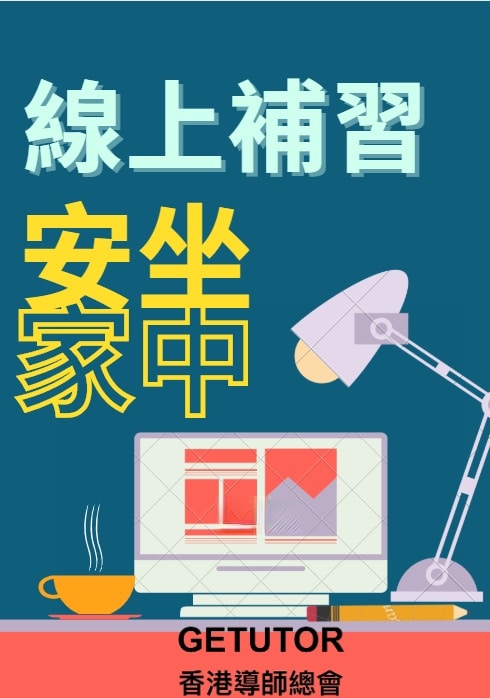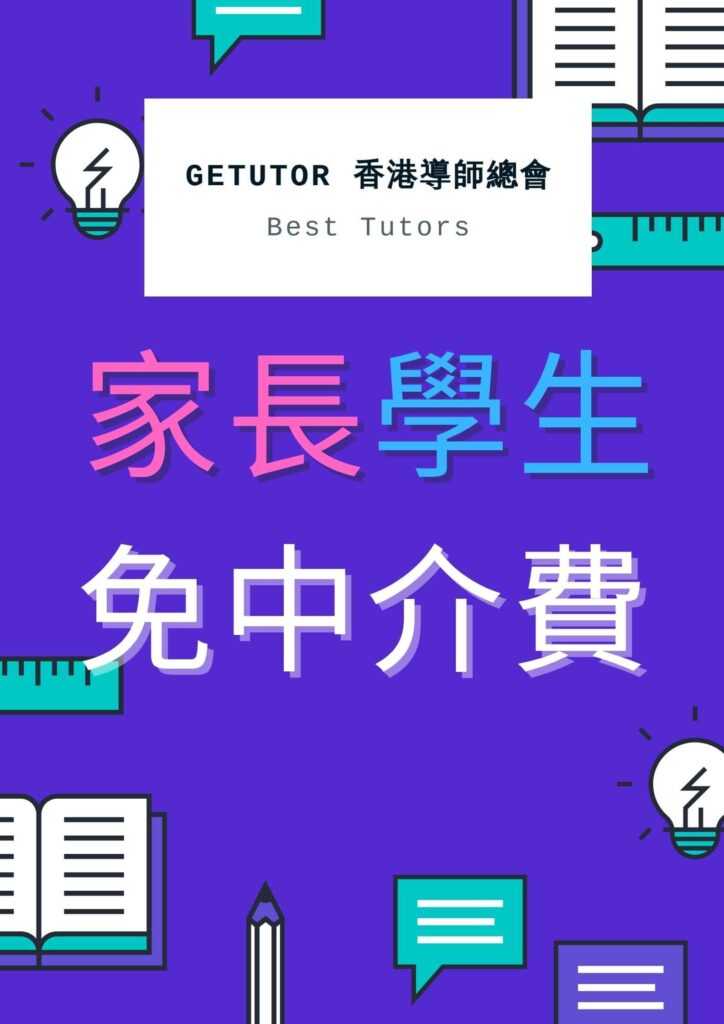Looking for high-quality academic lessons in Hong Kong? Look no further than Getutor! With our tutoring services, online learning platform, and extensive educational resources, we are dedicated to helping students enhance their knowledge and excel academically.
At Getutor, we understand the importance of personalized education. That's why we offer private tutors who are experts in their respective fields. Whether you need assistance in math, science, languages, or any other subject, our tutors are here to provide the guidance and support you need to succeed.
Our online learning platform allows you to access lessons anytime, anywhere. Whether you prefer live sessions or pre-recorded videos, you'll find a range of resources tailored to your learning style. With Getutor, learning is convenient and flexible, fitting seamlessly into your busy schedule .
We believe that education should be accessible to all. That's why we offer a wide range of educational resources, including practice materials, study guides, and interactive quizzes. Our goal is to empower students with the tools they need to achieve their academic goals.
Key Takeaways:
- Getutor provides high-quality academic lessons in Hong Kong.
- Our tutoring services offer personalized education with expert tutors.
- Access our online learning platform for convenient and flexible learning.
- We offer a wide range of educational resources to support your studies.
- Improve your knowledge and excel academically with Getutor.
Reflections on the School Curriculum – Present and Future
The school curriculum in Hong Kong is currently undergoing a process of reform that aims to enhance the quality of education and prepare students for the challenges of the future. This comprehensive curriculum reform is based on reflections and discussions on the current state of the school curriculum and the need for improvements. The reform measures include a broad range of initiatives that address various aspects of curriculum development.
One of the key goals of the curriculum reform is to enable students to construct knowledge and develop lifelong learning skills. The curriculum aims to promote active learning and critical thinking, empowering students to become independent learners who are capable of adapting to a rapidly changing world. Through the reform process, valuable feedback and input from the public and education professionals have been gathered, ensuring that the curriculum reflects the needs and aspirations of the community.
As part of the curriculum reform, pilot projects have been implemented to test and evaluate proposed changes before full-scale implementation. This iterative approach allows for adjustments and fine-tuning based on real-world experiences and insights. By piloting recommendations, the effectiveness of the curriculum can be assessed and Necessary improvements can be made before it is fully implemented in all schools.
The reform curriculum in Hong Kong encompasses a wide range of broad measures that aim to enhance the quality of teaching and learning. The curriculum development The process involves collaboration among various stakeholders, including educators, administrators, and policymakers. By working together, these stakeholders can contribute their expertise to ensure that the curriculum meets the needs of students and aligns with educational goals.
Table: Key Aspects of Curriculum Reform in Hong Kong
| Aspect of Reform | Description |
|---|---|
| Enhancing Student Engagement | Introducing interactive and student-centered teaching methods to enhance student participation and engagement. |
| Integration of Technology | Using technology as a tool to support teaching and learning, fostering digital literacy and skills. |
| Cross-disciplinary Learning | Encouraging the integration of knowledge and skills from different disciplines to promote holistic learning. |
| Assessment for Learning | Emphasizing formative assessments to provide timely feedback and support student progress. |
| Inclusive Education | Promoting an inclusive learning environment that caters to the diverse needs and abilities of all students. |
By implementing these broad reform measures, the current school curriculum in Hong Kong is being transformed to better meet the needs of students and prepare them for the future. The ongoing curriculum development and reform process reflects a commitment to continuous improvement and the creation of a dynamic and effective educational system.
Curriculum as Learning Experiences for Whole Person Development
The curriculum in Hong Kong is designed to provide lifelong learning experiences that foster the holistic development of students. It goes beyond academic knowledge and aims to cultivate generic elements for lifelong learning, such as critical thinking, positive values, and information technology skills. By offering a comprehensive education, the curriculum equips students with the necessary tools to navigate the challenges of the modern world.

Key Learning Areas (KLAs)
To ensure a well-rounded education, the curriculum is organized into Key Learning Areas (KLAs). These KLAs encompass various subjects and disciplines, providing a broad and balanced curriculum. The Key Learning Areas in Hong Kong include Chinese language education, English language education, mathematics education, science education, and more. By covering a wide range of subjects, students have the opportunity to explore their interests and develop a diverse skill set.
Generic Elements for Lifelong Learning
The curriculum also emphasizes the development of generic elements that are essential for lifelong learning. These elements include critical thinking, creativity, collaboration, communication, and information technology skills. By nurturing these skills, students are prepared to adapt to a rapidly changing world and become lifelong learners. The curriculum provides opportunities for students to apply these skills in various contexts, enabling them to build a solid foundation for future success.
| Key Learning Areas | Subjects |
|---|---|
| Chinese language education | Chinese language, Chinese literature |
| English language education | English language, English literature |
| Mathematics education | Mathematics |
| Science education | General studies, biology, chemistry, physics |
| Technology education | Technology and living, information and communication technology |
| Personal, social, and humanities education | History, geography, ethics and religious studies, life and society, economics and public affairs |
| Arts education | Visual arts, music, performing arts |
| Physical education | Physical education |
By integrating lifelong learning experiences and focusing on whole person development, the curriculum in Hong Kong equips students with the necessary skills and knowledge to thrive in an ever-evolving world. It nurtures their creativity, critical thinking, and values, enabling them to become well-rounded individuals who can contribute to society.
Enhancement of Quality Teaching and Learning
The reform curriculum in Hong Kong places a strong emphasis on enhancing the quality of teaching and learning. Recognizing that quality teaching is essential for student success, the reform measures aim to empower teachers and provide them with the necessary tools and support to unlock every student's potential.
Effective teaching and learning go hand in hand, and the curriculum reform in Hong Kong aspires to create an environment where students can thrive academically and personally. By promoting interactive and student-centered approaches, educators can engage students in meaningful learning experiences that foster critical thinking, problem-solving , and creativity. These approaches empower students to become active participants in their own education and enable them to apply their knowledge to real-world situations.
Assessment feedback plays a crucial role in the enhancement of quality teaching and learning. By providing timely and constructive feedback, teachers can guide students' progress, identify areas for improvement, and tailor their instructional strategies accordingly. The curriculum reform in Hong Kong emphasizes the importance of formative assessment, which allows for ongoing evaluation and adjustment of teaching methods to ensure that every student's learning needs are met.
| Benefits of Quality Teaching and Learning |
|---|
| Improved academic performance |
| Enhanced critical thinking and problem-solving skills |
| Increased student engagement and motivation |
| Promotion of lifelong learning |
| Preparation for future career success |
“Quality teaching and learning are at the heart of educational excellence. By investing in the professional development of teachers and providing them with the support they need, Hong Kong can nurture a generation of future-ready students who are well-equipped to thrive in a rapidly changing world.”
Empowering Teachers for Effective Teaching
To ensure the enhancement of quality teaching and learning, the curriculum reform in Hong Kong focuses on empowering teachers. Professional development programs are designed to equip educators with the knowledge, skills, and resources needed to deliver effective instruction. These programs provide opportunities for teachers to deepen their subject knowledge, explore innovative teaching strategies, and collaborate with their peers.
Furthermore, the curriculum reform encourages the establishment of professional learning communities where teachers can engage in reflective practice, share best practices, and learn from one another. By fostering a culture of continuous learning among teachers, the education system in Hong Kong can create a supportive and dynamic environment that promotes professional growth and ensures the delivery of high-quality education.
By enhancing the quality of teaching and learning, Hong Kong is paving the way for educational excellence and preparing students to thrive in a globally competitive world.
Flexible Use of Learning Resources
The reform curriculum in Hong Kong recognizes the importance of providing diversified learning resources to enhance students' educational experiences. Gone are the days of relying solely on traditional textbooks for knowledge acquisition. The education system now encourages educators to embrace a wide range of resources, including online platforms, interactive learning materials, and real-world applications, to cater to different learning styles and preferences. This shift allows students to explore topics in greater depth, engage in hands-on learning experiences, and develop critical thinking skills.
Furthermore, the reform also emphasizes a changing conception of learning time. It encourages educators to move away from a rigid approach that ties learning strictly to classroom hours. Instead, the focus is on creating flexible learning schedules that enable students to pursue their interests outside of traditional classroom settings. This could include participating in extracurricular activities, engaging in community service, or pursuing independent research projects. By broadening the concept of learning time, students have the freedom to explore their passions and develop a holistic understanding of the subjects they study.
The implementation of effective curriculum initiatives is a key aspect of promoting the flexible use of learning resources. Schools are encouraged to develop comprehensive plans that incorporate various resources, such as online learning platforms, educational apps, and multimedia materials, into their curriculum. This enables students to access a wealth of information and engage with diverse learning materials beyond the confines of the classroom. By leveraging technology and innovative teaching methods, educators can create dynamic and interactive learning environments that foster creativity, collaboration, and critical thinking.
Overall, the curriculum reform in Hong Kong recognizes that a one-size-fits-all approach to education is no longer effective in today's rapidly changing world. By promoting the flexible use of learning resources, encouraging a change in the conception of learning time, and effective curriculum initiatives, the education system aims to empower students with the knowledge, skills, and adaptability needed to thrive in an increasingly complex and interconnected global society.
| Benefits of Flexible Use of Learning Resources |
|---|
| 1. Enhanced engagement and motivation |
| 2. Personalized learning experiences |
| 3. Development of critical thinking skills |
| 4. Exposure to diverse perspectives and ideas |
| 5. Preparation for future careers and lifelong learning |
Student Entitlement of Learning Opportunities
Student entitlement of learning opportunities is a key focus of the curriculum reform in Hong Kong. The reform aims to provide a comprehensive and inclusive education system that caters to students at different stages of their academic journey. This includes early childhood education, 9-year basic education, and post-basic/senior secondary education.
The early childhood education stage aims to provide a solid foundation for young learners by fostering their cognitive, social, and emotional development. This stage sets the stage for future learning and prepares students for the transition to primary education.
At the 9-year basic education stage, students receive a well-rounded education that focuses on essential subjects such as Chinese language, English language, mathematics, science, technology education, personal, social and humanities education, art education, and physical education. This comprehensive curriculum ensures that students develop a broad range of knowledge and skills necessary for their future success.
The post-basic/senior secondary education stage is where students can pursue specialized subjects and prepare for higher education or vocational training. This stage helps students develop in-depth knowledge and expertise in their chosen fields, allowing them to make informed decisions about their future career paths.

Table: Key Learning Areas at Different Stages of Education
| Education Stage | Key Learning Areas |
|---|---|
| Early Childhood Education | Cognitive, social, and emotional development |
| 9-year Basic Education | Chinese language, English language, mathematics, science, technology education, personal, social and humanities education, art education, physical education |
| Post-Basic/Senior Secondary Education | Specialized subjects based on students' interests and career aspirations |
The reform curriculum in Hong Kong ensures that students have access to a comprehensive and balanced education that meets their diverse needs and prepares them for future challenges. By providing learning opportunities at each stage of education, Hong Kong is committed to nurturing well-rounded individuals who are equipped with the knowledge, skills, and values needed to thrive in today's global society.
Enablement Measures
In order to support the successful implementation of the curriculum reform in Hong Kong, a range of enablement measures have been proposed. These measures are aimed at ensuring coordination and collaboration among stakeholders, system adjustment and management, and professional development for teachers and educators.
- Coordination and Collaboration: Effective coordination and collaboration among all stakeholders involved in the education system are crucial for the successful implementation of the curriculum reform. This includes collaboration between schools, teachers, parents, and government bodies to ensure a cohesive approach and alignment of objectives.
- System Adjustment and Management: The reform curriculum will require adjustments and management at the system level to ensure its effective implementation. This includes developing policies and guidelines, allocating resources, and establishing mechanisms to monitor and evaluate the progress of the reform.
- Professional Development: Providing professional development opportunities for teachers and educators is essential to equip them with the necessary knowledge and skills to deliver the new curriculum effectively. This may include training programs, workshops, and mentoring initiatives to enhance their pedagogical practices and understanding of the curriculum reform.
By these enablement measures, Hong Kong implementing can create a supportive environment for the successful implementation of the curriculum reform. Coordination and collaboration will foster a sense of shared responsibility and ownership among stakeholders, while system adjustment and management will ensure that resources and support are provided where needed. Furthermore, professional development opportunities will empower teachers and educators to deliver high-quality education that aligns with the goals of the curriculum reform.
Table: Enablement Measures
| Enablement Measures | Description |
|---|---|
| Coordination and Collaboration | Effective collaboration among stakeholders, including schools, teachers, parents, and government bodies, to ensure a cohesive approach and alignment of objectives. |
| System Adjustment and Management | Adjustments and management at the system level, including developing policies and guidelines, allocating resources, and monitoring and evaluating the progress of the curriculum reform. |
| Professional Development | Providing professional development opportunities for teachers and educators to enhance their pedagogical practices and understanding of the curriculum reform. |
Factors Leading to Success of Curriculum Reforms
The success of curriculum reforms in Hong Kong depends on various factors. A holistic review of the school curriculum is conducted to identify areas for improvement. Advice is sought from stakeholders to ensure the reforms meet the needs of students and society.
Through a holistic review, educators and policymakers can gain a comprehensive understanding of the strengths and weaknesses of the current curriculum. This review involves analyzing the effectiveness of existing teaching methods, identifying areas where the curriculum may be outdated or lacking, and assessing the alignment with global standards and future workforce needs.
The input and advice from stakeholders play a vital role in shaping successful curriculum reforms. By engaging parents, students, teachers, and industry professionals, the education system can gain valuable insights and diverse perspectives. This collaborative approach ensures that the reforms are informed by the needs and aspirations of the community, fostering a sense of ownership and commitment to the changes.
“Effective curriculum reforms require a deep understanding of the current education landscape and the ability to anticipate future trends. By conducting a holistic review and seeking advice from stakeholders, Hong Kong can ensure that its curriculum reforms are relevant, rigorous, and responsive to the changing needs of students and society."
The success of curriculum reforms also relies on the continuous monitoring and evaluation of the implemented changes. This allows for timely adjustments and refinements based on feedback and evidence. By establishing a feedback loop, educators can ensure that the curriculum remains dynamic and adaptable, promoting continuous improvement in teaching and learning outcomes.
| Factors Leading to Success of Curriculum Reforms | Description |
|---|---|
| A Holistic Review | A comprehensive assessment of the curriculum to identify areas for improvement and alignment with global standards. |
| Advice from Stakeholders | Engaging parents, students, teachers, and industry professionals to gain diverse perspectives and ensure community ownership. |
| Continuous Monitoring and Evaluation | Establishing feedback loops to monitor the implementation and make timely adjustments based on evidence and feedback. |
Strengths of the Hong Kong Education System
The Hong Kong education system boasts several strengths that contribute to its reputation for excellence. These strengths include a strong emphasis on tertiary education, rigorous quality control measures, effective pedagogical systems, impressive test and examination results, and teachers' professional competence.
At the tertiary level, Hong Kong offers a wide range of world-class universities and higher education institutions that provide students with access to quality education and valuable learning opportunities. These institutions are known for their rigorous academic standards and commitment to producing well-rounded graduates who are equipped for success in their chosen fields.
According to the latest data, Hong Kong has consistently ranked among the top performers in international assessments such as the Program for International Student Assessment (PISA) and the Trends in International Mathematics and Science Study (TIMSS).
To maintain the high quality of education, Hong Kong's education system employs stringent quality control measures that ensure the integrity and effectiveness of teaching and learning. These measures encompass curriculum development, assessment practices, and ongoing evaluation to continuously enhance the educational experience for students.
The pedagogical systems in place in Hong Kong prioritize innovative and student-centered teaching methods, fostering active engagement and critical thinking among students. These approaches encourage independent learning, problem-solving skills, and the ability to work collaboratively, equipping students with the necessary skills for success in the ever-evolving global landscape.
The Hong Kong Education System in Numbers
| Indicator | Data |
|---|---|
| Percentage of students pursuing tertiary education | 78% |
| Number of universities and higher education institutions | 8 |
| International assessment rankings | Consistently among the top performers |
| Quality control measures | Rigorous and comprehensive |
| Focus on innovative pedagogical systems | Student-centered and collaborative |
With an education system that prioritizes excellence, Hong Kong continues to produce students who excel academically and are well-prepared for the challenges of the future.
Weaknesses of the Hong Kong Education System
The Hong Kong education system, while having strengths, also faces several notable weaknesses that require attention and improvement. These weaknesses hinder the system's ability to adequately prepare students for a globalized world and place undue academic pressure on them.
Exam-Oriented System
One of the key weaknesses is the system's heavy emphasis on exams. The education system in Hong Kong is often criticized for being too exam-oriented, focusing primarily on rote memorization and regurgitation of information. This narrow focus on exams can hinder students' development of critical thinking, problem-solving, and creativity skills, which are essential for thriving in a rapidly changing globalized world.
Disproportionate Allocation of School Resources
Another weakness of the Hong Kong education system is the disproportionate allocation of school resources. There are concerns about funding allocations and infrastructure development, with some schools having access to better facilities and resources than others. This imbalance not only creates an inequitable learning environment but also limits the opportunities available to students from less privileged backgrounds.
Academic Pressure on Students
Academic pressure is a significant issue within the Hong Kong education system. High workloads, intense competition, and the emphasis on exam performance create a highly stressful environment for students. This academic pressure can have negative impacts on students' mental health and overall well-being , as they often prioritize achieving high grades over holistic personal growth and development.
| Weaknesses of the Hong Kong Education System | Description |
|---|---|
| Exam-Oriented System | The system's heavy emphasis on exams hinders the development of critical thinking and problem-solving skills. |
| Disproportionate Allocation of School Resources | Unequal funding and resource distribution create disparities among schools and limit opportunities for some students. |
| Academic Pressure on Students | The intense competition and high workload contribute to significant academic pressure and stress among students. |
Conclusion
Enhancing knowledge with high-quality academic lessons in Hong Kong is crucial for achieving educational excellence and preparing future-ready students. By addressing the strengths and weaknesses of the education system and implementing curriculum reforms, Hong Kong can improve education for all students.
One way to enhance academic lessons is through the use of Getutor, a platform that provides free matching services for private tutors. By connecting students with experienced tutors, Getutor helps students access high-quality academic support and improve their learning outcomes.
By embracing innovative approaches to learning and providing a holistic education, Hong Kong can equip students with the skills they need to thrive in the future. This includes fostering critical thinking, creativity, and leadership abilities, which are essential for students to become future-ready individuals.
Ultimately, with a commitment to educational excellence and continuous improvement, Hong Kong can shape a brighter future for its students and ensure they are well-prepared to succeed in an ever-changing world.
FAQ
What is the purpose of the curriculum reform in Hong Kong?
The curriculum reform aims to provide lifelong learning experiences for whole person development, emphasizing generic elements for lifelong learning. It aims to improve the quality of teaching and learning and enhance the flexible use of learning resources.
How is the curriculum organized in Hong Kong?
The curriculum is organized into Key Learning Areas (KLAs) to provide a broad and balanced education. It covers key areas such as Chinese language, English language, mathematics, science, technology education, personal, social and humanities education, art education, and physical education.
What are the proposed curriculum reforms based on?
The proposed curriculum reforms are based on reflections and discussions on the current school curriculum. They aim to enable students to construct knowledge, develop lifelong learning skills, and improve the quality of teaching and learning.
How is the quality of teaching and learning being enhanced?
The reform curriculum in Hong Kong focuses on enhancing the quality of teaching and learning. It emphasizes the role of the school as the center of student learning and promotes a conceptual roadmap for lifelong learning. It also aims to use feedback from assessment to improve teaching and learning.
Is the curriculum reform in Hong Kong promoting the use of diversified learning resources?
Yes, the curriculum reform in Hong Kong promotes a shift from traditional textbooks to diversified learning resources. It encourages a change in the conception of learning time and time-tabling, as well as the implementation of effective curriculum initiatives to ensure flexible use of learning resources.
What stages of education does the curriculum reform cover?
The reform curriculum in Hong Kong aims to provide learning opportunities for students at different stages of education. It covers early childhood education, 9-year basic education, and post-basic/senior secondary education.
What enablement measures are proposed to support the implementation of the curriculum reform?
Enablement measures proposed include coordination and collaboration among stakeholders, system adjustment and management to ensure effective implementation, and professional development for teachers and educators.
What factors lead to the success of curriculum reforms in Hong Kong?
The success of curriculum reforms in Hong Kong depends on various factors, including a holistic review of the school curriculum and seeking advice from stakeholders to ensure the reforms meet the needs of students and society.
What are the strengths of the Hong Kong education system?
The Hong Kong education system has strengths such as a strong tertiary education system, high quality control over educational processes, effective pedagogical systems, and outstanding test and examination results. Teachers in Hong Kong are well qualified, highly trained, and respected in society.
What are the weaknesses of the Hong Kong education system?
The weaknesses of the Hong Kong education system include a narrow focus on exams rather than preparing students for a globalized world. There are also concerns about the disproportionate allocation of school resources, academic pressure on students, and a lack of emphasis on 21st-century skills.




